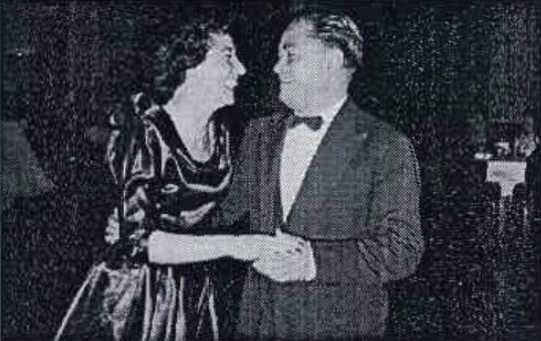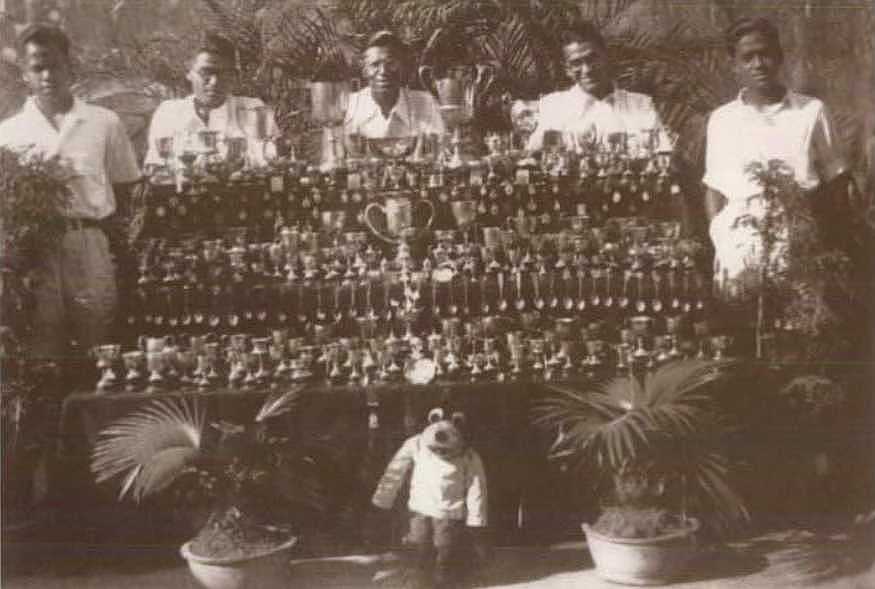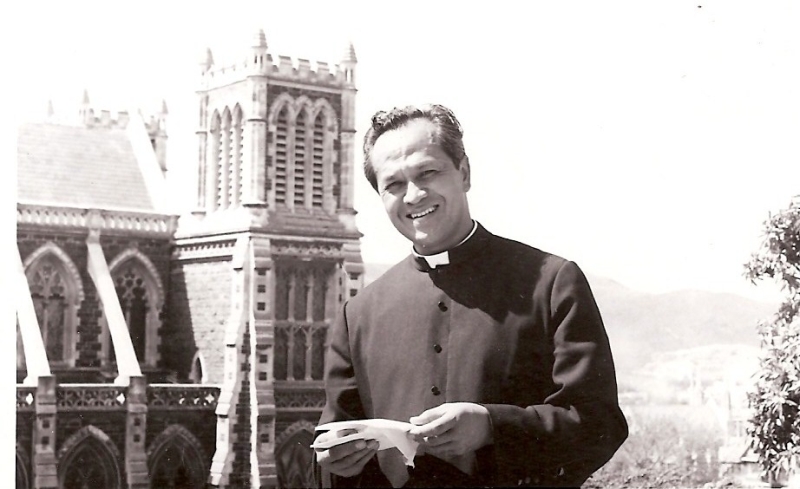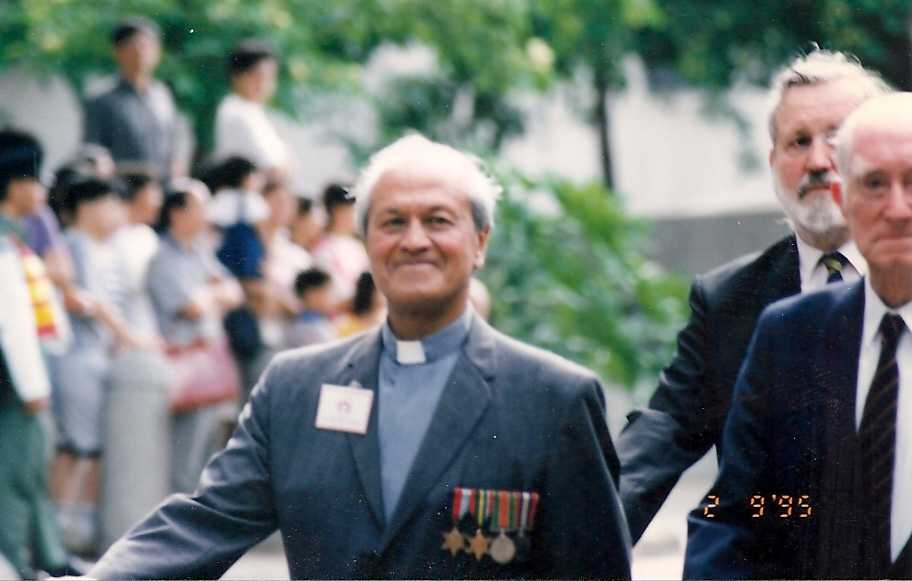Dr Eduardo Liberato "Eddie" Gosano 1914-2010
Feature Story from Club Lusitano, Hong Kong, 18/06/2021
Extracts from his extraordinary, and colourful autobiography, "Hong Kong Farewell", by Eddie Gosano, (1997), after he migrated to the USA. A full copy is available in the Club Lusitano Biblioteca.
The Gosanos
I was born in Hong Kong, an island at the bottom of China. I lived there for 44 years. How that rocky speck of land, overshadowed by Communist China became the third mightiest financial center in the capitalistic world defies logic. I know. I was part of the administration that made it what it is.
My father Julio dos Passos Gosano, was the second son (and this is significant) of Leonardo Jose Gosano, a lieutenant in the Portuguese Colonial Army. Grandfather Gosano in the 1800s was based on the Portuguese island colony of Timor. He was later seconded to Macao to serve in the military constabulary as lieutenant and in time be promoted to captain. He retired as major on 12 November 1891 in Macao. Thirteen years later on, 11 November 1904, he died.
This is enough insight of my ancestry to give you a particular insight into Portuguese, as well as other Western European culture of those times. Major Gosano came from landed gentry in Togal, Portugal. It was the custom for the first born son to be the heir of the estate. The second son was to be a soldier. So fated, Grandfather Leonardo Jose Gosano was destined to end his days and leave his progeny in the Far East colony of Macao.
My mother's maiden name was Adeliza Maria Marques. Her father was a Goan of Indian origin with a trace of Portuguese. Her mother Antonia Luz, was a Portuguese with probably one-fourth Chinese ancestry.
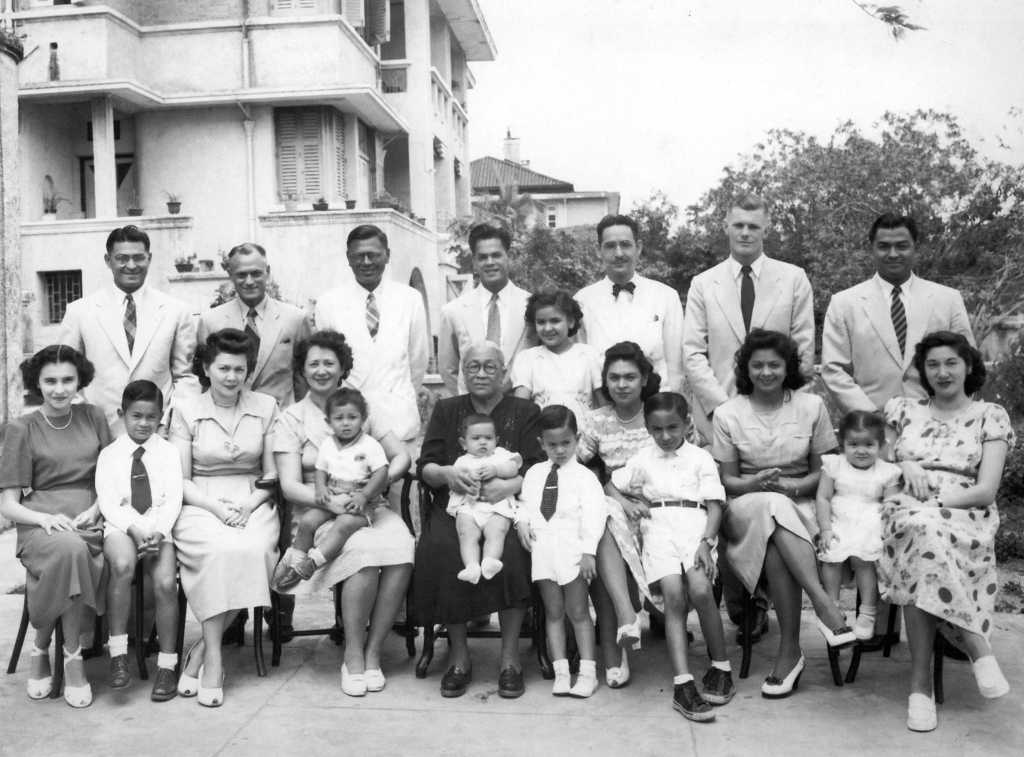
Look not in dismay, I beg of you, at this medley of European and Far Eastern identities. Exotic Macao and HK defy comparison with America's melting pot. Our racial commingling is more recent and due to the consequence of mortal earthquakes amid the never ending upheavals of human society surrounding our part of the world. We are left trying to preserve a sensitivity to our ancestry of which we are proud, especially we Portuguese.
When she was married to my father, mother was 17. Like clock works every 2 years a new addition was made to the family. By the time she was 25 there were 5 children including me. This was on course for a virile Portuguese husband, a Catholic, where birth control came only from breast feeding and possibly abstinence.
Being such a tiny colony, Macao afforded limited openings for a livelihood, which is why my father migrated to HK where I was born. He found a position as bank clerk in the HK & Shanghai Bank. Gifted with a beautiful handwriting, he was soon assigned the important responsibility to record all new accounts.
This bank was and still is situated in the centre of Victoria, the capital of HK, on Queen's Road Central.
Discrimination, British Style
Lowering the historical curtain to this point, let me add that the HK & Shanghai Bank where my father was noted for his handsome penmanship, was immediately across the tram lines, an arm's throw from the most prestigious English clubs, the HK Club and the HK Cricket Club. My father because of his non-British nationality, was not a member of either club. The wily British, fore-stalling the possibility that hordes of colonist refugees might someday invade their shores, to claim their rights as citizens, never granted them citizenship. All those not of British extraction in HK came under the legal designation as Chinese (who comprised 95% of the population). While we Portuguese were independent citizens of our native land, for all practical and legal purposes in HK we were Chinese.
The discrimination hurt most in the economic exploitation. My father, for instance, after 20 years service with the bank, was being paid a monthly wage of $300 HK, the equivalent of US$50.
By that time there were 9 children in our family. My 2 oldest brothers, Adelino Vitus and Bellarmino Tomas, were working as clerks. My third brother, Carlos Noberto (nicknamed Carlinho) left school early and was working at the same bank. By the time I was 8 years old I was attending school on my own, three or four miles from home.
St Joseph's school was run by a Catholic order of Christian brothers. It was situated a third of the way up the Victoria Peak, and was approachable by tram car.
I was on the electric tram, returning home from school, when, as another tram was crossing on another track, a relative spotted me and shouted the news. My father Julio dos Passos Gosano, age 40, had just drowned in HK Harbour. That year was 1923.
One Flat, for 18 of us
My father left his family a provident fund of $15,000 (HK). Thanks to some questionable good influences, including two of my mother's brothers, this money was quickly gambled away in the stock exchange.
Adelino Vitus - Lino as he was called, being the eldest, became the father of our family and guided our destinies as best he could. But words are beyond my reach to convey the courage of Lino and my mother. We were living a flat in Tin Lock Lane on waterfront at the entrance to Happy Valley in HK. Not only did my mother have to oversee us 9 Gosanos, there were with us in the same flat her 2 younger bachelor brothers, Jose and Luiz Zeferino Marques. Then there were 4 orphaned cousins Mano, Atina, Alita, and Natercia Rodrigues. All 18 of us lived in that flat.
How did my mother manage? First, every one of age worked. All were required to share their wages. And through living a very modest way of life, my mother managed to rear all of us until everyone was able to go on our own.
The plight of the Gosanos was little different than that of the vast majority of HK. For all its expansion there has never been adequate housing. Kowloon, from the misty past, has always been overspilling with impoverished families.
Medical School
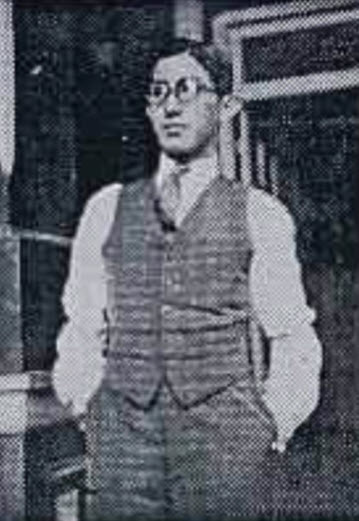
When I was about 13 years old Lino asked me, "What preference would you have for your future education?"
Being impressed with our family doctor, Dr Ozorio, in one of his visits to render aid to one of the family, I replied that I would like to be a doctor. Lino was then Secretary to the Registrar of HK University. His work entailed all of the secretarial details of the operation of the University. That included the local matriculating school examinations for admittance. At the end of the year 1929, I matriculated from St Joseph's College, qualified scholastically to enter the University of HK as a medical student.
At that time I was only 15 years old; that's was 2 years short of the requirement for entering the medical college. But as I said, Adelino Vitus Gosano was Secretary to the Registrar. He did not look too closely at my birth certificate. In 1930, only 10 days after my 15th birthday, I was probably the youngest person enrolled in the University of HK. I was given a Sir Paul Chater Memorial Scholarship plus a scholarship from Socorro Mutos, a local Portuguese Society that contributed to needy students. This paid my tuition. Even though we were limited in our financial resources, my mother managed to supply me with the means to round out my extra needs. I resided at the newly opened Ricci Hall, a Jesuit hostel, for all of the 7 years of my studies at the University.
Earns $8 a month
My degree was conferred in January 1937. Not long after that I was able to obtain the post of Houseman (Intern in the US vernacular) to Professor K.H Digby, Professor of Surgery in the Faculty of Medicine at the University. I was anaesthetist for all surgery for the benefit of medical students. Three times a week on Mondays, Wednesdays and Fridays, from 7am to well into the afternoons, surgery took place. ... Let me tell you a bit about how anaesthesia was administered in HK in 1937. It was given on a mouth mask covered with gauze. Ether or chloroform was applied in drops until the patient went under. A heavy towel was placed over the mask to keep the amount of anaesthetic to the minimum. Meanwhile the anaesthetist was inhaling almost as much ether or chloroform as all of the patients combined for the day.
My post as surgical Houseman kept me in the hospital 24 hours a day, 365 days of the year 1937. The stipend of $50(HK), equivalent to $8 US, monthly. After my first five months the entire hospital was transferred to a new 600-bed facility the Queen Mary Hospital. Following my 1st year as houseman in the University surgical unit, I was offered a position in the Medical Department of the HK Government in Kowloon...the work was the same. But the salary jumped to the fabulous amount of $200(HK) a month or about $35 US.
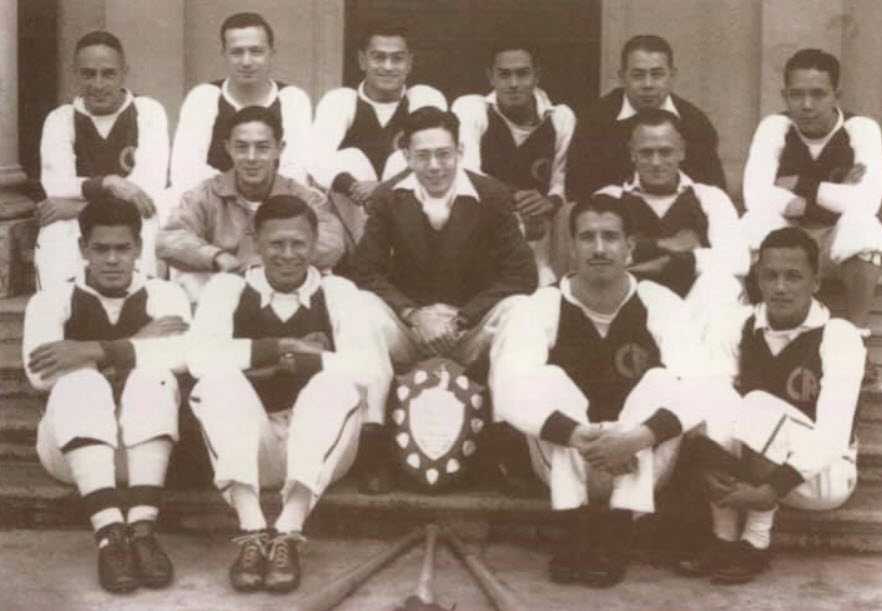
Clube de Recreio, Hong Kong Softball Team, 1939
On 1 January 1939, at the age of 24 I was appointed Surgical Medical Officer of the Medical Department of HK in Kowloon Hospital. But mind you there were strings attached. While of Portuguese ancestry and status as recognised in my native country, here in the British colony, I was still legally classified as Chinese. My compeer was Dr G.A.V. Griffith, a Britisher of 45 or 50 years of age. The two of us performed all surgery for this Government Civil Hospital. Our workload was measured in terms of free services, for 100,000 people, 24 hours a day.
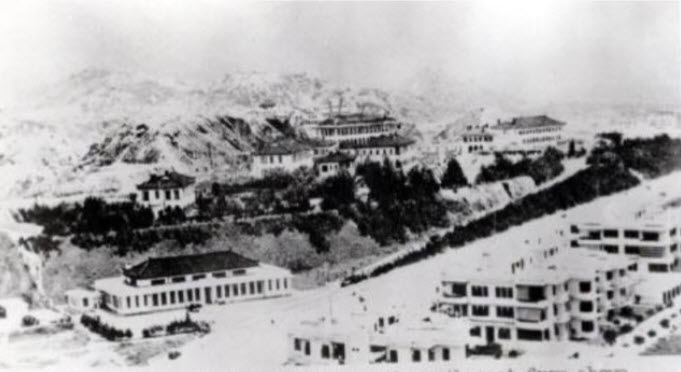
My salary was now $375 (HK) per month, or $62.50 US. Each year the stipend increased $25 (HK) monthly. We Chinese medical officers were given 2 weeks leave yearly. English medical officers were given 9 months leave every 3 years with passage 2 and from the United Kingdom for the whole family. This status was permanent in our contract during the pre-War period irrespective of our years of service in the HK Government. It was as a doctor would be inclined to say, a bitter pill to swallow.
Japan Invades HK, I volunteer for Prisoner of War Camps
Emergency plans had been made in advance. At such time I was to call my senior surgical officer, Dr. Issac Newton. He assigned me back to Kowloon hospital, which was close to Kai Tak Airport. The Airport was the main target of the Japanese air force. Casualties were streaming into the emergency centres in Kowloon.
From Monday through Thursday we worked like dogs on casualties without number. Then the Japanese over-ran Kowloon. All work ended. There was no gas, no electricity, no more sterilized equipment for surgery. We at Kowloon Hospital were simply isolated. No more ambulances were running. No cases coming in.
On Thursday morning 12 December a lone Japanese soldier with a rifle came up the drive of the Hospital. About 150 yards behind came a sergeant with a sword and revolver. The two of them took over the hospital without resistance.
On the 11th day of our captivity we were taken to the Kowloon Hotel at the tip of the peninsula... We were not fully settled into the hotel when we had a visitor. He was a senior medical officer of the Japanese Army. His name was Major Konishi. He had a problem. British wounded prisoners-of-war were being kept at a camp on Argyle Street. The war was still raging in HK. Japanese casualties like our own, were heavy. The Japs were strapped for medical personal for their own needs. Would some of us volunteer to serve our own casualties on Argyle Street?
The three senior medical officers were of British origin. They of course volunteered to care for their own. I was ranked as a junior medical officer because of my Chinese status. Just the same Dr. Newton said, "Eddie, you come too, you have to help me."
I didn't have to "come too". There was a way out for me. A way that meant freedom in Macao. Macao was a Portuguese colony only 40 miles away and Portugal was not at war with Japan. In fact the Governor of Macao at that time was issuing an invitation to HK doctors of Portuguese origin but with British degrees to practice freely in Macao. But my senior medical officer had accorded me equal dignity in the profession and now he needed me. And who, more than casualties of the war, needed our services more? It was instilled in our family to serve where there was need. I volunteered. ...
Try to picture this camp through a physician's eyes: a few dozen zinc huts housing 20 to 30 persons each. No beds. Patients and doctors alike slept on planks propped above ground level My job was the dirty work of cleaning and dressing wounds. There were so many wounded it took long hours each day...
It is not easy to describe the circumstances in such prison camps. Before the war I had been an outstanding athlete in HK. My weight when entering the camp, was a fighting 155 pounds. It came down to 130 pounds on the starvation diet. The wounded prisoners, despite their injuries, were given no better fare. Besides this, there was always the mortal fear, hanging over us like the sword of Damocles, of committing some infraction. One and all knew the treatment meted out to offenders of the Japanese Army. The penalty for any transgression of the purported code of the Japanese Occupation, was death by beheading in the street.
Grotesque: A prisoner of war, about to be beheaded by a JapaneseStranded Among the Prisoners
Now at Argyle Street, Dr Newton had made use of his position as surgeon to get out of prison and reside in a civilian hospital called St. Theresa's Hospital on Prince Edward Road. Dr Uttley had a bout with dysentery and was treated at St Theresa's and then sent to the civilian prison camp at Stanley in HK.
This left Dr. Hargreaves and me stranded like surplus baggage in the prisoner-of-war camp at Argyle Street. Then they transferred us to the Sham Shui Po Camp, a prison camp for other ranks or OR's, from all the forces - British, Canadian, Indian, Eurasian, Portuguese - that had fought for HK.
There were almost 200 Macanese (Portuguese) in these prison camps. Among them, besides myself, were my three younger brothers, Luigi, Jerry and Zinho who had all volunteered for the defense of HK. Zinho was sent to Japan to work in their coal mines and was kept until liberated by American soldiers after Japan surrendered.
Dr. Hargreaves and I languished at Sham Shui Po for months despite our pleas to the Japanese commandant that we were civilian medical personnel. We were in prisoner of war camps in the first place because we had volunteered when Major Konishi, the Japanese medical officer, asked for our help. With the war ended and the Royal Army Medical Corps once more available, why were we left stranded like excess baggage for 7 months with no fruitful work in a military prison camp?
We Migrate to Macau
In June 1942 Dr Gosano was allowed to leave the POW camp and return to his family. Shortly thereafter he was invited by fellow Portuguese Dr HLP Ozorio to work in the British Consulate in Macao.
In June 1942 there were 3 doctors of Portuguese origin from HK practicing in Macao. There were Drs. Ozorio, G.A.V. Ribeiro and J.W. Barnes. I was, on arriving in Macao, immediately given the same privileges as they.
We had our own medical offices and billed the British Consulate for services rendered. However, the number of refugees from HK became so great that it was becoming a financial impossibility for the British Consulate to keep up. So we 4 doctors agreed to be paid at staff wages. Our staff were on call 24 hours a day with at least one doctor on call night and day at the out patient clinic. House visits were made where necessary. We were not allowed to see or treat patients in the Macao Govt. hospitals and had no privileges for surgery.
Soon after arriving I was privileged to become the attending physician to the British Consul, Mr J.P. Reeves. His daughter was Leticia, called Tecia. Tecia had chronic and recurring asthma. This entailed almost daily visits in the evenings as her bouts of acute asthma usually came at sunset. I became a family friend and was constantly in their house in the evenings for meals and also a game of Mah Jong with his wife Rhonda and his office secretary, a Portuguese girl named Micas Gonsalves and the Consul himself.
Heading up the Secret Service
Also I became physician to an English lady named Joy Wilson. Her husband, Geoffrey, was a police commissioner of the HK Police. And there was another English lady, Mrs E.J.R. Mitchell, in Macao.
In the spring of 1943 the two women, along with the European manager of the Macao Electric company, decided to leave Macao and try to get through the Japanese lines to the headquarters of the Allied forces in Kun Ming, China.
Then came an astonishing event. I would not have been surprised had her husband the Police Commissioner been head of the British secret service. But then Mrs Joy Wilson confided in me that she was the head of the BAAG, the British Army Aid Group. "You are the one person I feel I can trust, Dr Gosano", she said.
Incredible as it sounded, she asked me to take her position as head of the underground BAAG in Macao.
There was not a more suicidal state to be caught in while still alive, no matter what your nationality or where you were caught. The Japanese had their counter underground too. And there was always that testy question of Portuguese neutrality - what incident might provoke hostilities and Portugal would find herself involved in the War?
For one thing the BAAG was tied in with some river pirates, three brothers named Wang. They were depended on to transport people through the Japanese lines around Macao to allied headquarters in Kun Ming (Kunming), China.
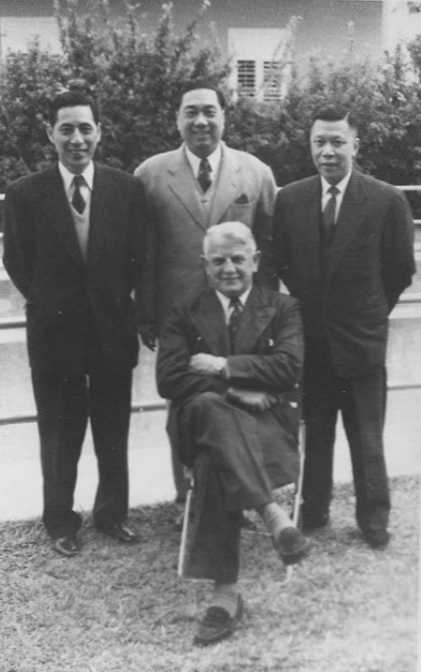
Joy Wilson was leaving 3 Chinese associates in the Macao BAAG. They were Y.C. Liang (known as P.L.), Fung Bay and N.K. Mar. Liang was a rice merchant with a small shop in the center of Macao near St Domingo Church. He became a rich and prominent financier after the war. Fung Bay became his right hand man, and still works for the Liang family in HK.
The Commandant of the BAAG was Lieutenant Colonel L.T. Ride. Ride had been a professor of Physiology at the University of HK. When war came he was in the Royal HK Defence Force. He was interned with all of the volunteers of the RHKDF at Shum Shui Po prisoner of war camp. But almost immediately his personal Chinese secretary came to the sea wall in a junk and Professor Ride was able to escape over the wall. The two of them made their way to Kunming, China. There Ride organized the BAAG with himself as Commandant.
I had known him from my cricketing days at the University of HK. During 1935 and 36 I was captain of the student team that played the faculty in what was called the annual Phoenix Match. Now in our new association in the BAAG, each of us had a code name. I am sure Lt. Col. Ride was recalling those cricketing days when he gave me the code name Phoenix.
Being a practising physician made my friendship with the British Consul quite plausible and my medical clinic was the perfect cover for British agents visiting Macao. The function of the BAAG in Macao was to correlate any information that could be important to the British Army. We were also helpful to personnel needs of the Allies. There was the time when 3 American aviators were shot down around Canton, China. One was a fighter pilot and the other two were pilot and gunner on a torpedo plane carrier. They were picked up by fishermen and taken into Macao to the British Consul. The river pirates and of our group took the 3 to China.
At any point along this chain of intrigue, had the Japanese detected the rescue, heads would have fallen and possibly an altercation between Portugal and Japan could have occurred. I lived in a constant stage of apprehension, wondering why I had agreed to relieve Mrs Joy Wilson. Being an undercover agent working against a deadly and crafty enemy was no imaginary danger. It was real. I carried a small pistol for the years of my work with the BAAG. Despite the abiding dread of execution I remained with the others in the secret service until Japan surrendered and the occupation ceased.
Escape of Leo d'Almada
The Honorable Leo d'Almada was the leading representative of the Portuguese community in HK. Mr. d'Almada was a QC (Member of the Queens's Council), as well as a member of the Executive Council of the HK Government. He was housed in a pavilion on the tennis court of the Governor of Macao.
The British Consul received a message from the British Government. The Consul was to tell d'Almada that the Government wanted him in England to take part in organizing a task force prepared for retaking and rehabilitating HK when Japan would eventually be defeated. Mr d'Almada well knew the dangers of trying to escape to England through the Japanese network. He declined the summon.
The British Government requested me through the BAAG to see Mr. d'Almada. As we were acquainted socially, I could address him personally. "Leo" I said, "as head of the BAAG in Macao, I know of this message from England. As the senior Portuguese in HK, it is very important to us Portuguese, as well as British subjects, for you to go to England. Our organization will get you safely to Kunming and then to London."
His obligation must have been weighing on his conscience. He did not take affront at my boldness. What worried him was the thought of leaving his wife in such precarious abandonment should he be caught. "Could Tilly come too?" he asked " I am not sure" I said. "I will ask Y.C. Liang. He will be directly involved."
Leo and Tilly d'Almada were delivered safely through the perils by our underground agents. Mr d'Almada would return to HK one day, prepared for the provisional takeover Government.
Epilogue
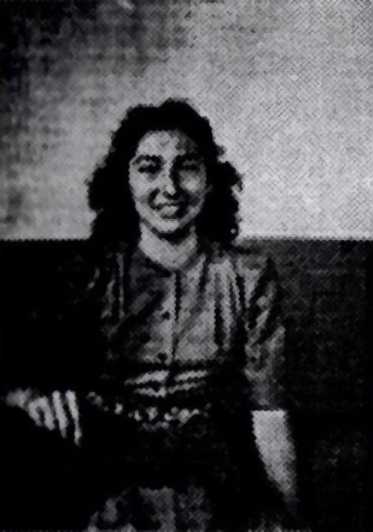
Immediately after the war (on 26 November 1945), Dr Gosano married Hazel Lang, a Eurasian girl who had been his neighbour in Kowloon, at St Theresa's church. They had 3 daughters Stephanie, Susanne and Edwina.
Dr Gosano returned to Kowloon Hospital after the war as a "Chinese medical officer". He was then assigned to Queen Mary Hospital for general and ear, nose and throat surgery. Despite his heroic efforts during the war and for his perilous work for the BAAG, he was subjected to continued colonial discrimination in the service of the HK government.
It was only with the intervention of his follow BAAG comrade, Major Bevan Field of the HK Investment Company (HK Land) and the HK Volunteers, was he eventually able to set up private practice in Edinburgh House 14 years after his graduation.
In 1950 he was invited to serve as member of the Urban Council, representing the Portuguese interests in HK, replacing Dr A.M. Rodrigues. He served in this capacity for the next 10 years particularly on select committees concerning public health. In his own words "This service was without any kind of remuneration save for the appreciation of the people we served".
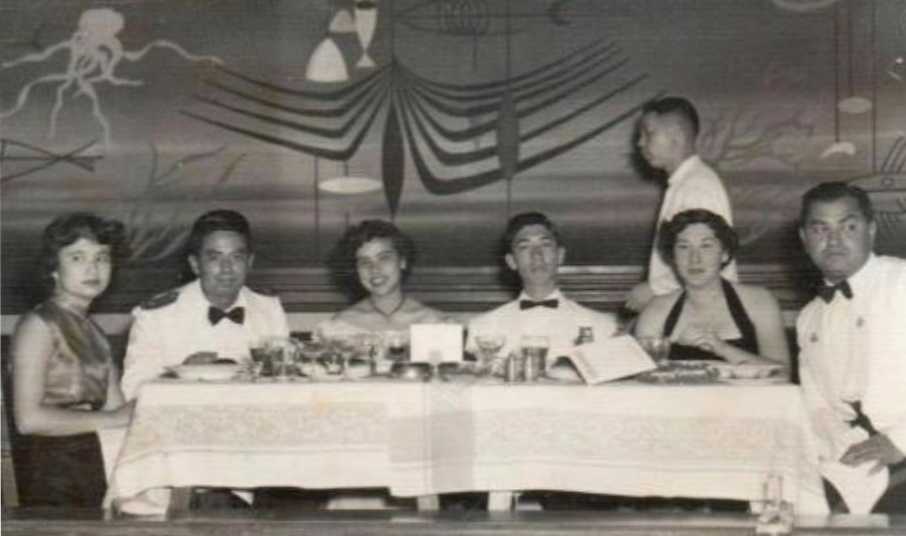
Dr Gosano also continued his service as a medical officer with the HK Regiment of the Defense Force volunteering in 1949 with the rank of Captain. He rose to senior medical officer of the HK regiment with the rank of Major in 1955.
He migrated to the United States in 1960, securing a position as an intern at St Joseph's Hospital, San Francisco. At the time HK medical qualifications were not recognised there and he was required to serve 3 years as a mature age 46 year old intern to complete his MD degree in the USA.
He died in San Francisco aged 96.
